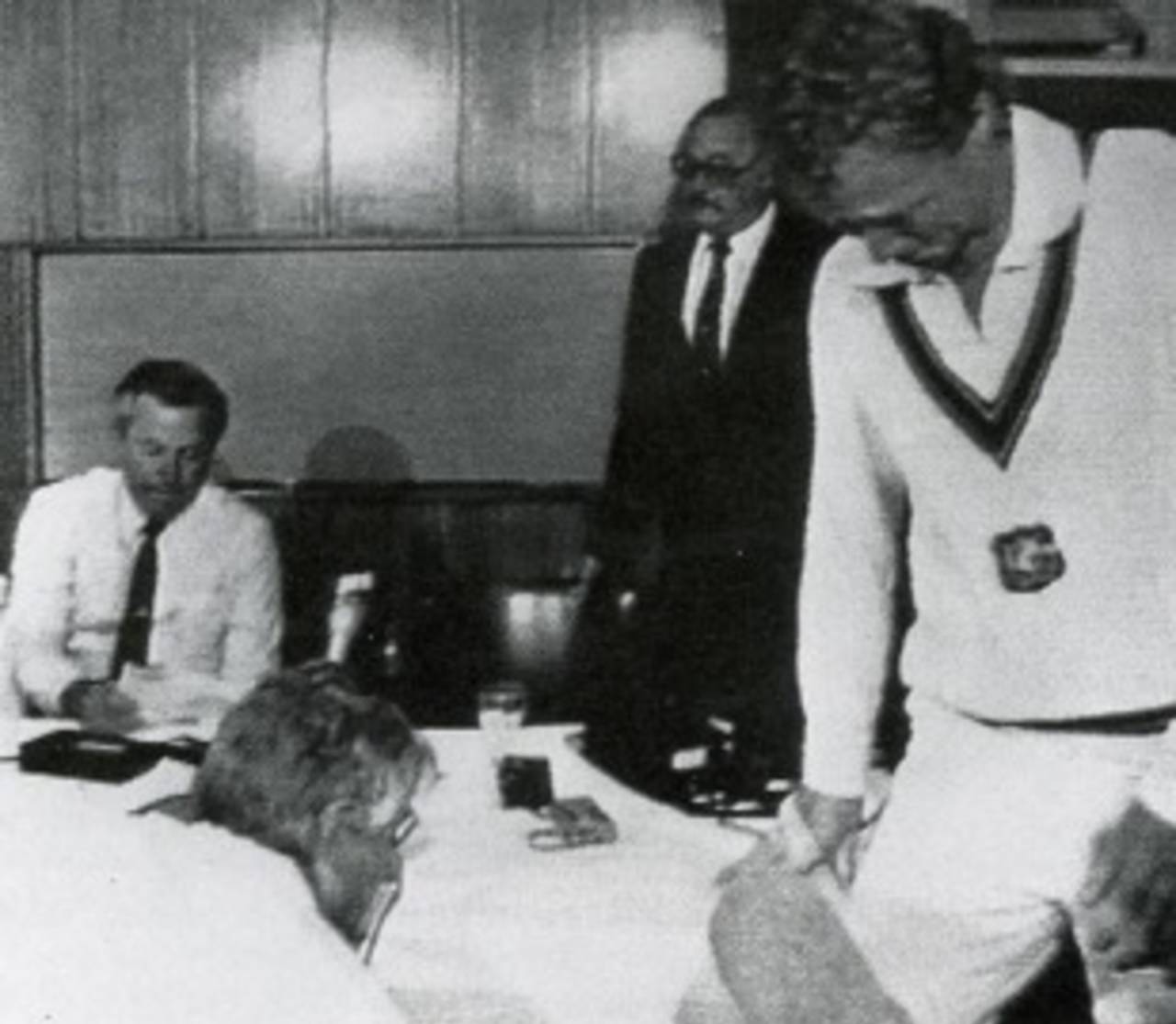The man who finished reading Hughes' statement
Kim Hughes never completed reading the statement he'd prepared for the press during his emotional resignation in 1984. The person who did recalls that most poignant day
Sidharth Monga
26-Dec-2011

The reaction from the press: "Stunned. Quiet. Just hush." • ESPNcricinfo Ltd
It is the most poignant cricket press conference of all time. It's November 26, 1984, and Kim Hughes has finally given in. At the Gabba, after Australia have lost to West Indies for the fifth straight time, Hughes has finally decided it isn't worth it anymore. During the regular post-match press conference, Hughes reaches out for a piece of paper in his pocket, and starts reading out from it.
"The constant speculation, criticism and innuendo by former players and section of the media over the past four-five years have finally taken their toll. It is in the interest of the team…" Hughes then pauses. He is choking. He licks his upper lip. He holds back emotion.
From the background a voice says, "I think the spelling is right. In the interest of the team…" As if to remind Hughes where he has stopped. Hughes gulps and then says, "It's in the interest of the team and Australian cricket." He chokes again. He decides he can't have more of it. And tells that voice, "You read it." Bob Merriman, then the manager of the Australian team, finishes the statement.
It was the saddest day, and one of the longest, in nearly the 50 years Merriman has spent in cricket. It began early in the morning when Hughes asked him to join him at breakfast before the fourth day's play. Hughes had already batted in the second innings, and still needing 135 to avoid an innings defeat, the last five wickets weren't expected to take the match much further. At 8am the two, "very friendly" captain and manager met.
"He told me that morning that he wanted to give it away," Merriman remembers. "And then he asked me to get hold of Greg Chappell, which I did, because Greg was a selector and a very close friend. We were in Brisbane fortunately, where Greg lived. I got Greg in, we met at the ground, and it just flowed from there."
Except it didn't quite flow. Hughes, Merriman and Chappell were the only three who knew, and David Boon and Wayne Philips got into a partnership out there. Every minute was uncomfortable. "It wasn't good. It was not good at all," Merriman says of that wait, although he hadn't been taken by surprise by Hughes' decision. "I could see that he was not happy with what was occurring with his own form," he says. "He wasn't happy that his own batting was falling down. The team wasn't performing well. We were getting well and truly beaten by West Indies. They were a great side and he had had 10 matches on the trot against them, which was very difficult, and he had a reflection on the tour of England in '81, and the World Cup '83. They hadn't been very successful for him. I think it all just built up."
What had also built up was that two of his team-mates, Rod Marsh and Dennis Lillee, never respected him as captain. "He was one hell of a follower," Marsh said of Hughes, his captain. Marsh was the vice-captain when former captain Chappell retired, but the job went to Hughes. Hughes' two riled-up Western Australian team-mates thought he was a softie, and made life difficult for him.
Hughes wrote the entire statement, all in his handwriting. "I put one word in it," Merriman says. "I was asking him to make it shorter. I had the feeling it was too long. He wrote it. It was all in his handwriting. In a part of it he said he didn't have the support from journalists. I put in the word 'some' in there. He had great support from Peter McFarline, he had great support from Michael Coward. He had support from the guy in Adelaide, whose name escapes me. He put a general statement that the journalists he had no support from. I put the word 'some' in there. That's the only change I made."
Merriman never expected it would turn out the way it did. When he did finish the statement, the room of journalists, who were moments ago trying to follow Hughes with their microphones, went quiet. "Stunned. Quiet. Just hush." It was an interesting moment. You can feel the journalists would have been stunned beyond imagination, especially when the man, the Australian cricket captain, broke down in front of them, but not even a single question? "Oh Michael Coward asked one. I forget the question, but he did ask."
The immediate concern for Merriman was to look after Hughes. "We had a few moments in the dressing room," he says. "Maybe half an hour. To their credit, Graeme Wood in particular, and Terry Alderman, both Western Australians, looked after Kim really, really well. Graeme Wood and Terry took Kim out and tried to settle things down before they flew home the next day. They flew home together."
Hughes played only two more Tests, scoring three ducks and a couple. Immediately after he was dropped, Australia won a Test, in Sydney, finally stopping the West Indies juggernaut, which had been rolling for 11 straight Tests. He remains one of the most fascinating stories of Australian cricket. Merriman went on to become one of the more important administrators. He played part in convincing a young Allan Border to not give up captaincy after he had lost to Jeremy Coney's New Zealand. He also became Cricket Australia's chairman in 2001.
Hughes' hand-written statement, that piece of paper, is still with Merriman. Where does he keep it? "I am not going to tell you."
Sidharth Monga is an assistant editor at ESPNcricinfo